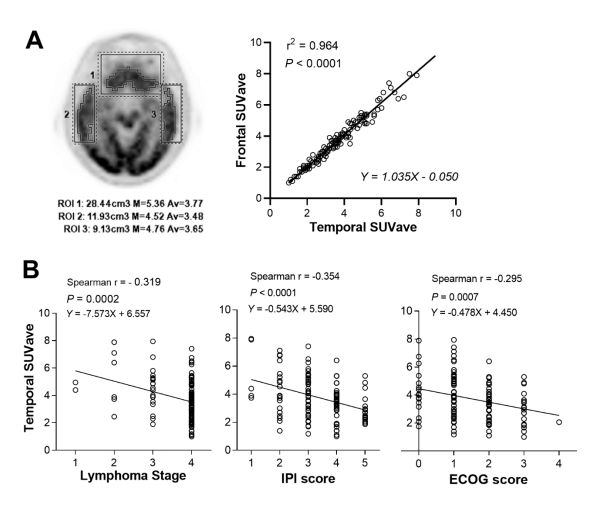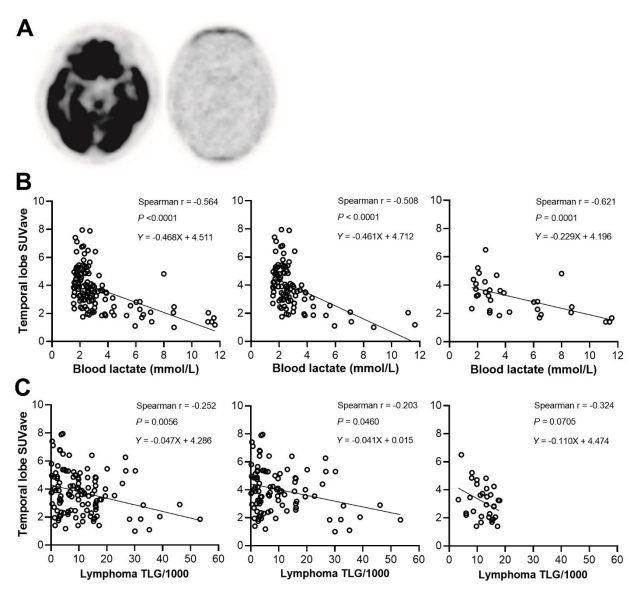글로벌 연구동향
핵의학
- [Sci Rep.] Lymphoma total lesion glycolysis leads to hyperlactatemia and reduction of brain glucose utilization
성균관의대 / 이현경, 이경한*
- 출처
- Sci Rep.
- 등재일
- 2022 Jul 25
- 저널이슈번호
- 12(1):12639. doi: 10.1038/s41598-022-16562-z.
- 내용
Abstract
Clarifying the mechanism of lymphoma-associated hyperlactatemia could help identify patients at risk. Here, 129 non-Hodgkin's lymphoma patients suspected of blood lactate elevation underwent blood measurement and 18F-fluoro-2-deoxyglucose (FDG) positron emission tomography (PET) on the same day. Blood lactate elevation was mild (1.0-2.5 mmol/L) in 60, moderate (2.5-4.0 mmol/L) in 46, and severe (≥ 4.0 mmol/L) in 23 subjects. Subjects with severe lactate elevation had higher lymphoma stage, worse IPI risk, poorer ECOG performance, and higher tumor TLG. Furthermore, there was a linear correlation between blood lactate concentration and lymphoma TLG (Spearman's r = 0.367; P < 0.0001). Brain FDG uptake was low (SUVave < 4.0) in 81 patients that were older, had greater stage and IPI risk, worse ECOG performance, and higher blood lactate. Brain SUVave showed inverse correlation with blood lactate (Spearman's r = - 0.564; P < 0.0001) and lymphoma TLG (Spearman's r = - 0.252; P = 0.0066), as well as with stage, ECOG score, and IPI risk. Multivariable regression analysis confirmed increased blood lactate and lymphoma TLG as significant explanatory variables for reduced brain SUVave (both P < 0.0001). Hence, blood lactate elevation in lymphoma patients is the result of glycolytic tumor burden. Since brain cells prefer lactate over glucose as energy source when blood lactate level is increased, this causes proportional reductions of brain FDG uptake. FDG PET/CT can therefore identify high glycolytic lymphoma burden at risk of hyperlactatemia and may provide estimates of its severity by reductions in brain uptake.

Affiliations
Hyun Kyung Yi 1 , Jang Yoo 2 , Seok Jin Kim 3 , Joon Young Choi 1 , Kyung-Han Lee 4
1 Department of Nuclear Medicine, Samsung Medical Center, Sungkyunkwan University School of Medicine, 50 Irwon-dong, Gangnam-gu, Seoul, 16351, Republic of Korea.
2 Department of Nuclear Medicine, Veterans Health Service Medical Center, Seoul, Republic of Korea.
3 Division of Hematology-Oncology, Department of Medicine, Samsung Medical Center, Sungkyunkwan University School of Medicine, Seoul, Republic of Korea.
4 Department of Nuclear Medicine, Samsung Medical Center, Sungkyunkwan University School of Medicine, 50 Irwon-dong, Gangnam-gu, Seoul, 16351, Republic of Korea. khleenm@naver.com.
- 덧글달기









